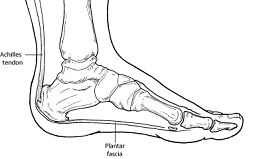What is Plantar Fasciitis?
 Plantar Fasciitis is a condition of the foot that is most commonly associated with heel pain. The long fascia at the bottom of the foot, which aids in stiffening the bones during walking, becomes inflamed. This usually happens at the attachment under the heel bone but may also occur further along the foot. As the condition progresses the fascia may become weak and tear.
Plantar Fasciitis is a condition of the foot that is most commonly associated with heel pain. The long fascia at the bottom of the foot, which aids in stiffening the bones during walking, becomes inflamed. This usually happens at the attachment under the heel bone but may also occur further along the foot. As the condition progresses the fascia may become weak and tear.
How did I get Plantar Fasciitis?
The causes of plantar fasciitis are multi-factorial and can involve inappropriate footwear for your foot type, poor training programs, weakness in the foot and leg and lack of range through the ankle and 1st toe to name a few.
What does Plantar Fasciitis feel like?
Plantar fasciitis usually starts with pain on standing after a period of rest, for example in the morning upon waking or after exercise when you cool down. In the earlier stages that pain usually gets better when you warm up again. If the condition progresses the structure of the fascia begins to change and lose its tensile strength in the area of pain. When this occurs, you may feel more pain throughout the day, and progress so that standing alone becomes a difficult task.
Give us a call on 02 9460 6788 to discuss how we can help you with Plantar Fasciitis.
How is Plantar Fasciitis diagnosed?
Plantar fasciitis can usually be diagnosed from the clinical signs and symptoms. Imaging modalities such as Ultrasound and MRI are useful in detecting progression such as fasciosis and tears of the Plantar Fascia, or ruling out other causes of heel pain such as fractures and nerve entrapments.
How do I fix Plantar Fasciitis?
- Rest from stressful activity is important until the pain settles so you may need to stop or limit running and other impact activity for the feet.
- A cold pack or ice for at least 10 minutes daily will generally help calm the inflammation.
- Shoe modification, if your current shoe is not the correct type for your foot posture. Usually a shoe that has plenty of support and less flexibility through the arch works best.
- Stretching for calf and hamstring muscles.
- Foot strengthening as the condition starts to ease.
In some cases your plantar fascia problem will resolve from using these simple measures. If it does not improve then you may need professional consultation and/or orthotic support. If there are tears present in the Fascia then immobilisation in a walking boot is beneficial.
Will I need surgery?
Surgery is very rarely required for plantar fasciitis.
How do I stop Plantar Fasciitis coming back?
Continuation of stretching routines and muscle strength together with adherence to correct shoes and orthotics if prescribed should keep the condition from returning. It is however not uncommon to experience intermittent relapses of the heel pain.
Plantar Fasciitis is one of the conditions we treat at Shore Physio, so please give us a call on 02 9460 6788 to discuss your condition and schedule your session.